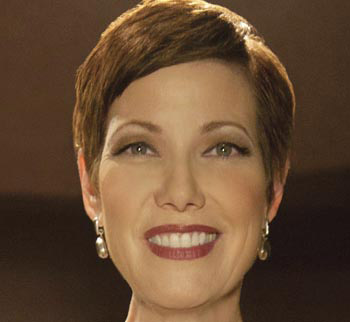TORONTO — Canadian journalist Libby Znaimer knows what it takes to survive against all odds and how to overcome the challenges of rehabilitation.
Znaimer has successfully battled not one, but two cancers: breast cancer in 2006, and pancreatic cancer – the most lethal kind of all – in 2008.
On Oct. 8, Zoomer Media’s vice-president of news and information for Classical 96.3FM and AM740, will share her story as the honoree at Beit Halochem Canada’s Woman of Distinction Award luncheon.
The event, to be held at the Oakdale Golf and Country Club, will raise funds for Beit Halochem, an Israeli organization that helps 51,000 wounded veterans and victims of terror to recover from their injuries and psychological trauma.
From her office in Zoomer Media’s headquarters in Toronto’s Liberty Village neighbourhood, Znaimer spoke candidly about her unlikely survival story, as well as her lifelong connection to Israel and its people.
Having grown up in a Zionist home with her older brother, Canadian media mogul Moses Znaimer, the self-proclaimed “staunch” Zionist had even entertained the idea of making aliyah.
“Many people aren’t aware, but I lived in Israel for nearly five years when I was younger… I was there shortly after the Yom Kippur War, which was very traumatic for people,” she recalled.
“I got my first job in journalism with the Associated Press in Tel Aviv and I covered terrorist attacks.”
One of the attacks she covered was the Coastal Road massacre of 1978, regarded as one of the worst terrorist attacks in Israel’s history, which involved the hijacking of a bus. In the attack, 38 Israelis, including 13 children, were killed, and 71 were wounded.
“It was quite traumatic. I’ve seen all of that. So it’s very meaningful for me.”
She said her personal experience with recovery and rehabilitation has made her connection to Israeli victims of war and terror even stronger.
“It’s hard enough when there are no visible signs [of injury] on you. When it comes to cancer, some people have different lasting problems and some people don’t. I’m very lucky that I don’t. To have to recover with a disability, I mean, I can’t even wrap my head around it.”
After her diagnosis in 2006, she tested positive for BRCA2, a genetic mutation more prevalent in Ashkenazi Jews that increases the likelihood of developing breast, ovarian and pancreatic cancer.
In 2008, a year after she endured months of surgery, chemo and radiation, Znaimer learned that she had pancreatic cancer, a disease that has a five-year survival rate of about six per cent.
She was lucky that her pancreatic cancer was detected before it spread. But it was wrapped around a main artery and vein and couldn’t be operated on unless her doctors succeeded in shrinking the tumour.
Znaimer and her doctors decided to try an experimental treatment to shrink the pancreatic tumour by targeting the BRCA2 mutation.
Today, the growing number of pancreatic cancer survivors can credit Znaimer, the national spokesperson for the Pancreatic Cancer Canada – a foundation that raises awareness and funds for the fourth biggest cancer killer in North America – for being the first patient at Toronto's University Health Network to test out a treatment plan that has had some success in treating a cancer that is largely considered incurable.
“No one was more surprised than my doctors when it worked,” Znaimer said.
“They started treating people with the BRCA mutation that way and they respond better to treatment… I think I probably responded way better than the average, but what they started to do is they test every case for BRCA now at Princess Margaret [Cancer Centre in Toronto] and some other places,” she explained.
“It’s a big advancement for a small subset of patients. Literally, I was just about the first case. I’m lucky that it wasn’t the next person.”
Beit Halochem luncheon chair Susan Flam said she is thrilled to be able to recognize Znaimer as a woman of distinction.
“Not only is she professionally accomplished as a journalist, broadcaster, and radio executive, but she has braved and won her battle with cancer and she supports many cancer-related causes. She gives back,” Flam said.
“Both the veterans and the honoree have a kinship with each other, because all of them have faced major roadblocks in their lives. They have had really arduous journeys to regain control of their lives.”
At the luncheon, Hanoch Budin, an Israeli war veteran who served in Lebanon in 1982, where he lost his right arm in an explosion, and who went on to win eight swimming medals at the Paralympic Games, will also speak on behalf of the organization.
For more information, call 905-695-0611, or visit www.beithalochem.ca.
